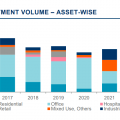There is a growing awareness among the companies worldwide to reduce the carbon footprints on the planet and to comply with the climate guidelines. Many businesses in the world have committed themselves to work on reducing emissions, and to invest in the infrastructure development that aligns with the the planet Earth’s sustainability goals.
Corporate real estate plays a huge role in zero Carbon mission because the buildings and entire supply chain of designing buildings and infrastructure contributes heavily to the climate concerns. A report published by United Nations Environment Programme (UNEP) in December 2020 says—”Emissions from the operation of buildings hit their highest-ever level in 2019, moving the sector further away from fulfilling its huge potential to slow climate change and contribute significantly to the goals of the Paris Agreement.” (See the report.)
The construction industry that works closely with the real estate sector has two primary challenges. One, they impact the climate directly by greenhouse gas (GHG) emissions. Two, they need to pay carbon taxes when the buildings are in use. Ironically, the impact on climate comes back to the buildings itself which means on their real estate investment and ROI goals itself.
See related post: How modern real estate prepares itself for climate challenges
Customers understand climate concerns
The climate concerns are traveling to the customers too and the way they evaluate the residential projects are also changing. Does the project owner comply with sustainability goals—do they have a documented policy where they are committed to reduce the carbon footprints. It should be interesting to find if they are willing to pay higher while planning to buy a home.

Same customer sentiment applies for office space too. For example, do the office space buyers of the tenants and their workforce consider investing in such commercial real estate space that might be unfit because there are no green or energy saving credentials?
“Rising emissions in the buildings and construction sector emphasize the urgent need for a triple strategy to aggressively reduce energy demand in the built environment, decarbonize the power sector and implement materials strategies that reduce lifecycle carbon emissions,” said Inger Andersen, Executive Director of the UN Environment Programme (UNEP).
Green lease for the landlord-tenant relationship
Green buildings are entering into the discussions in corporate real estate investment calls. The owners and other stakeholders should use technology-driven systems to plan for realistic targets whether in the building design, vendor selection, construction, maintenance, and the entire supply chain of real estate development.
For project owners who plan to rent out their buildings and office space on lease, green leases are the way forward. In a green lease, the landlords and tenants agree to comply with the building’s low or zero carbon and sustainability goals for the use of energy and other resources. As Tanya Broadfield, Director of Sustainability, Savills UK says—“With occupiers and landlords working together, any green lease will ideally enhance the environmental and social performance of a building, help to mitigate any sustainability regulations and market risk and also foster improvements in data collection for reporting.”
The way commercial real estate and the number of residential projects are growing in Mohali Aerocity and on the Mohali Airport road, sustainable real estate can contribute to the region’s climate goals.















People reacted to this story.
Show comments Hide comments[…] In addition to the lease, the office design standards are also changing. The occupants are looking for some wellness areas, and the tenants want to know if the facilities comply with the sustainability standards in building design. […]
[…] are aware of the growing climate concerns worldwide and they are likely to select homes in such projects who have documented evidence of […]
[…] rents. Tenants are trying to sustain their physical presence through a more flexible lease model. See green buildings and green lease for more information on retail and the changing landlord-tenant […]
[…] The pandemic has changed the office space dynamics not only for the working models but the employees’ working sentiment too, such as compliance to climate and sustainability goals. It adds a new dimension to the landlord-tenant agreements such as green-lease and green buildings. […]
[…] Real estate and climate: How green buildings and green lease are changing the landlord-tenant relationship […]